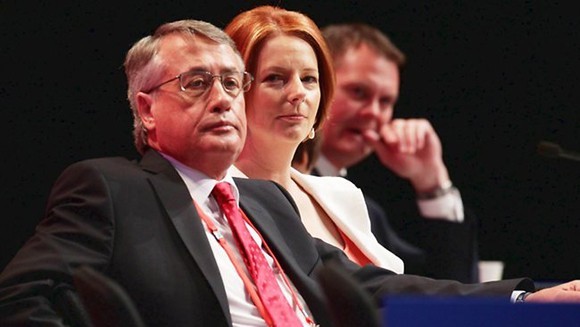THE nation’s top lawyers have demanded the Gillard government revisit gay marriage, warning Labor’s reforms will fail to deal with discrimination against same-sex couples unless the Marriage Act is radically changed.
The Law Council of Australia has also backed proposals by the Attorney-General’s Department that would require agencies and departments to allow people to identify themselves as M for male, F for female or X for “indeterminate/intersex/unspecified” when giving personal information.
In a submission on Labor’s plans to amend the Sex Discrimination Act, the law council says it does not believe that discrimination against same-sex couples can be addressed sufficiently without changing the law in relation to marriage.
The reform proposals are designed to meet an election promise to prohibit discrimination on the grounds of sexual orientation and “gender identity”.
The government released its Sex Discrimination Amendment Bill after Julia Gillard and Attorney-General Mark Dreyfus dumped their wider anti-discrimination plan to consolidate laws on race, sex, disability and age discrimination amid a backlash from business, church-run schools and aged-care providers and the conservative governments of Victoria, NSW and Queensland.
But the bill contains a new exemption that means discrimination would not be unlawful if it accords with the 1961 Marriage Act, which defines marriage as the union of a man and a woman.
The exemption would apply to commonwealth-registered marriage celebrants as well as the registers of births, deaths and marriages. “The law council queries the need for this exemption and suggests the government’s current policy on same-sex marriage should be revisited, having regard to the full range of Australia’s international human rights obligations and the government’s commitment to removing all forms of discrimination against the (lesbian, gay, bisexual, and transgender) community,” the submission says.
The Prime Minister is opposed to gay marriage, but faces pressure from Labor’s gay group, Rainbow Labor, which wants to make the issue a key theme in the September 14 election.
The explanatory memorandum to the bill says that introducing protections on the grounds of sexual orientation, gender identity or inter-sex status “does not affect current government policy on same-sex marriage”.
But the law council says the explanatory memorandum fails to give a “full account” of Australia’s international human rights obligations in this area. It points to moves by 11 countries and nine US states to legalise gay marriage.
The law council is also backing moves by the Attorney-General’s Department to develop draft guidelines on the recognition of sex and gender, which would require agencies to consider whether there is a legitimate need for the information and to give the option to select “X” where it is.
The move follows a 2011 move to allow “sex and gender diverse” people to be issued with a passport marked M, F or X.
But the council says it wants the guidelines to be strengthened, including with a central body to report on progress.
Author: Annabel Hepworth
Publication: The Australian
Publication Date: April 30 2013

